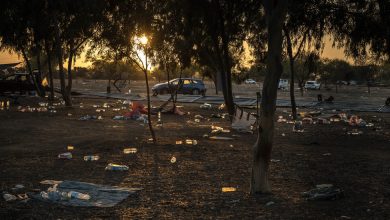Russian attack on Lviv shakes sense of security in a relatively safe city.

Vlada Belau believed she had finally established a semblance of normalcy in the city of Lviv after fleeing from Kyiv, nearly 300 miles to the east, when it was bombarded in the early days of the war.
One month later, she was going to cafes and dinners with friends and had even started a job at a local media office. But when Russian missiles killed seven people on Monday, it disrupted the sense of security that she had painstakingly constructed.
“I saw the smoke drifting and the anxiety started exploding inside of me,” said Ms. Belau, who has been staying with the parents of a friend at a place about three miles from one of the explosions.
“It was then that I truly felt that there is no place to be completely safe in this country,” she said, explaining that it was the first time since the war started that she had considered fleeing across the border to Poland.
Many in Lviv, like Ms. Belau, have learned to acclimate to the sounds of air raid alarms and even occasional strikes on military facilities. But the scenes of billowing smoke from the center of the city were a stark reminder that the violence now razing cities and villages to the east could be at their doorstep, too, at any moment.
The city, no more than 50 miles from the western border with Poland, has been largely spared direct attacks as Russia has focused its attention on larger and more strategic areas to the east. It has turned into a critical gateway to safety for the millions of Ukrainians who have fled westward to escape the worst of the fighting, which is concentrated in the east.
Hundreds of thousands of displaced people have passed through the city’s train and bus stations as they look to cross the border and reach foreign lands. For others, it is a new home, if fleeting. The city, which had about 720,000 residents before the war began, has since welcomed at least 350,000 more people who were displaced from other parts of the country.
Until Monday, the only direct targets that had been hit in Lviv were a fuel storage site and tank facility in the city’s northeast, struck by several missile strikes about three weeks ago. Before that, a pair of attacks targeted an airport facility and a military base just outside the city, killing at least 35 people.
The war, nonetheless, has transformed the city.
Known for its quaint cobbled streets flanked by historic architecture and statues — a UNESCO world heritage site — Lviv was quickly repurposed from a tourist hub to a vital base of operations. Since the war began in late February, it has served as a channel for humanitarian supplies, aid workers and foreign fighters to front line cities.
The new arrivals in Lviv have transformed the face of city and the signs of the change are omnipresent. Residents have been rapidly trying to acclimate to living on the periphery of the war and at the center of a massive humanitarian crisis that has enveloped its neighborhoods.
Roman Trubchaninov, 31, arrived in the city only a week ago, after fleeing his home in Mariupol, which has been pummeled by Russian bombs since the first days of the war, destroying many of the homes on his street. He had sheltered in a basement for weeks before he was offered a ride out of the city by his wife’s relatives. It took him two weeks to traverse the country and reach Lviv.
The quiet in the city was unnerving at first, he said. But then his anxiety subsided.
“I started to feel human again,” Mr. Trubchaninov said. “I had a home, groceries — it felt like a chance at a new life.” He has even started playing saxophone with a local band. But he said that part of his mind is always thinking about the war. “I’ve relaxed here but my mind-set, it is forever changed from this war. I am never fully at ease,” he said. Monday’s missile strike was an ominous affirmation of the reality he could not shake.
The attack, which seemed to fit a pattern of Russian strikes on military infrastructure across the country over the past four days, was an ominous indication that the war could be moving closer to Lviv.
Russia’s Defense Ministry said on Monday that its military had struck 108 areas where Ukrainian military and forces were located over the past 24 hours.
It also said that it had used missiles to destroy a Joint Logistics Support Center in the Lviv region that was used to store “large-scale shipments of foreign weapons that had arrived to Ukraine over the past six days from the U.S. and Europe.” Ukrainian officials said that empty warehouses were hit.





